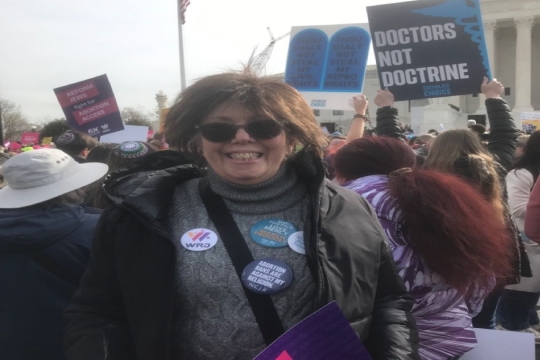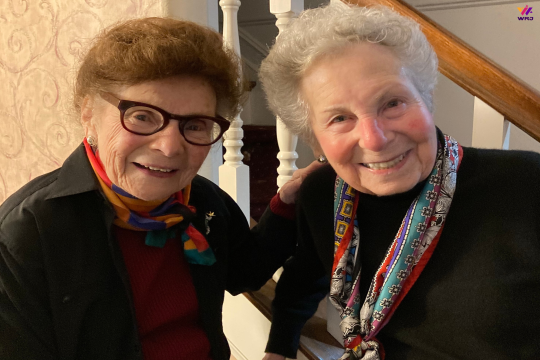“Moses said to G-d, ‘When I come to the Israelites and say to them, ‘The G-d of your fathers has sent me to you,’ and they ask me, ‘What is His name?’, what shall I say to them?’ And G-d said to Moses, ‘I will be what I will be.’ He continued, ‘Thus, shall you say to the Israelites, ‘I will be sent me to you.’” (Exodus 3:13-14)
As a Jewish autistic bisexual transgender woman, “I will be what I will be” is something I have had to tell many people throughout my life, as they have questioned, judged, mocked, and discriminated against me for who I am. However, I feel that my journey into Judaism has empowered me like none other, and has given me the strength to persevere over the challenges I have faced in my life, leading me to my current path of rabbinic study at Hebrew Union College.
My Jewish journey begins in 1996, when I was born into an interfaith family from a secular Ashkenazi Jewish mother and an Italian-American Catholic father. At two years old, I was diagnosed with autism by my pediatrician. At six years old, I began to realize that I wanted to be a girl, though I wouldn’t learn about transgender people until I was 11. My childhood was challenging, as due to my autism, I was always seen as different from other kids. I didn’t understand why my teachers wanted me to play with the boys and not the girls. I spent much of it alone as I couldn’t figure out how to make friends or follow social cues. In addition, I had an abusive, homophobic, and transphobic father who made me afraid to come out as transgender or bisexual, so I mostly stayed in the closet until college.
Growing up, I didn’t have much exposure to Judaism. There were no synagogues in my town, and my parents weren’t really interested in raising me with any sort of religion. I only knew of maybe a couple other Jewish families in town. We did Chanukah for some years, but that was about the extent of our Jewish practice at the time. My family also carried the cultural burden of internalized antisemitism, because when my mother’s family immigrated to the states, they mostly wanted to hide their Jewish identity in favor of their American identity. Because of these factors, I didn’t have the childhood experiences that many associate with Judaism. In my youth, I had no religious education, no summer camp, no b’nei mitzvah, and very little idea about what Judaism actually was. However, I don’t regret not having had those experiences, because becoming Jewishly involved as an adult gave me the maturity to embrace all of the complexities and questions of the Jewish experience.
Freshman year of UC Davis was my first real introduction to deep Jewish practice. My sister, who attended the same university as me, told me that I should go check out Hillel and go to a Shabbat service. I hadn’t really been to one before, but I figured, since I was in college, I might as well try new things and reconnect with my Jewish identity. After the service, I fell in love. I even started humming nigunim in the dorm showers. I started coming back week by week and received compliments on my voice when I would sing along. Eventually, the folks at Hillel pushed me to be more involved, and by the end of Freshman year, I was giving Divrei Torah and spending a lot of my time there.
Being in college, I was also in a much more transgender-friendly environment, so I started dressing as a girl part-time before I would come out publicly the following year. I remember the first time I walked into Hillel wearing a dress. The staff and students there were kind and respectful and made me feel welcome there. Later, I would learn that coming out as transgender at Hillel made the space safer for other LGBTQ Jewish students there, and they felt more comfortable about being out at Hillel. That summer, I went to Israel with my sister on Birthright, and on that trip, at the age of 19, I had my bat mitzvah.
The following year, I began taking hormones and medically transitioning, coming out as transgender later that year. Other than my father, most people thankfully turned out to be accepting. It was around this time also that I turned more to Judaism to find the strength to handle transitioning, and finding my spiritual path helped me in this regard. I then became even more involved in the Jewish community, and in part because of my autism, Judaism became my biggest special interest, and I was able to teach myself how to lead a service just by watching other people lead. Eventually, I made a lot of friends at Hillel and became the primary leader of services there. I also took Hebrew classes, attended a Reform synagogue outside of Hillel, and went to Torah study there as well, in order to increase my Jewish knowledge. They even hired me as a religious school teacher for fourth and fifth grade.
One day, I was chatting with one of my friends, and she suggested that I should become a rabbi. At first, I was puzzled but then it made sense. I got more information about what rabbinical school would entail and realized that becoming a rabbi was my true path. After a long and arduous application process, I finally was accepted into HUC. I then began my first year of HUC in my Year in Israel, and although it was been cut short due to the Coronavirus, my Year In Israel was a formative and unforgettable experience.
While it has sometimes been difficult, my life experience has taught me to be a more loving, tolerant, compassionate, and forgiving person. I’ve learned that for me, the best way to respond to criticism of who I am, and also to respond to the compliments I receive, is to tell people that in the end, I will be what I will be.
Aria Caligiuri is a transgender autistic bisexual Jewess who loves nature, art, music, and spirituality. She is studying to become a rabbi at HUC.
Related Posts
Image

Andrea Stillman: A WRJ Leadership Spotlight
This week, Women of Reform Judaism interviewed Executive Committee member and Mid-Atlantic District President Andrea Stillman. Read more to learn about her leadership journey with WRJ, and watch Andrea’s video Q&A here. How did you come to be a WRJ leader? That's a very easy answer for me.
Image

Celebrating 100 Years: A Journey Through Time
This year my congregation is celebrating a very special milestone: the 100-year anniversary of our community. Temple Israel Long Beach in southern California was chartered in February 1924. For this important anniversary, the temple has been celebrating with many events throughout the year.
Image
Celebrating the Mothers of Israel: A Women’s Seder
Several weeks ago, I was asked to write something for this blog about a program called ‘Celebrating the Mothers of Israel,’ which would have been cool, but we hadn’t in fact had a program with that name.

